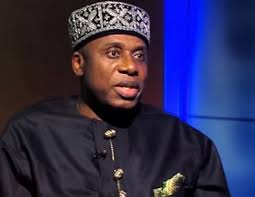The Minister of Transportation, Rotimi Amaechi, has defended the $2 billion Kano-Maradi, Kano-Dutse Railway project connecting Niger Republic despite criticisms in some sections of the media against the project.
On why it is so important for Nigeria to go into Maradi, Amaechi said, ‘’It is simple, currently the Niger Republic is exporting through Benin Republic. All the countries that are landlocked in the West African Region are exporting through Benin Republic, Togo, Ghana, Ivory Coast. Why are they not exporting through Nigeria? Oh, your roads are bad, so the railway takes care of that, oh customs are difficult, they will charge us things that are not what we are charged in the Benin Republic, Immigration does not allow us.
“So what we are saying to you is we come to Maradi, we build offices, we build a warehouse, you put your thing in the warehouse, you deal with customs at Maradi, you deal with immigration at Maradi, deal with police or whatever you need for the goods to go, once you put the good on top the wagon, straight to Lagos, once it gets to Lagos, straight to the ship because the things you would have done in Lagos, we have done in Maradi. So it makes it cheaper and easier to do business.
“No community will stop the train and say where those things from Niger are? Or if you are importing from outside the country and you are from Niger or Chad, as soon as you finish from Lagos seaport the next place you see your goods is at Maradi,” he added.
Amaechi noted that what they are doing is to grow Nigerian business and economy as those people who will be coming will sleep in Lagos, pay for a hotel and do business, assuming the ship is not leaving that day.
It can be recalled that President Muhammadu Buhari, on Tuesday, February 9, 2021, performed the groundbreaking ceremony of the $2 billion Kano-Maradi, Kano-Dutse Railway Project.
This follows the approval by the Federal Executive Council in September 2020, for the rail line and the subsequent signing of the contract documents for the commencement of the project in January 2021.
The rail line is expected to financially empower Nigeria as the import/export hub for Niger and would help the country compete favourably with other coastal countries of West Africa in servicing the landlocked countries around, in the area of movement of cargoes to make Lagos seaports more viable.

 Health6 days ago
Health6 days ago
 Entertainment1 week ago
Entertainment1 week ago
 Crime6 days ago
Crime6 days ago
 Education1 week ago
Education1 week ago
 Health1 week ago
Health1 week ago
 Comments and Issues7 days ago
Comments and Issues7 days ago
 Football1 week ago
Football1 week ago
 Latest7 days ago
Latest7 days ago

